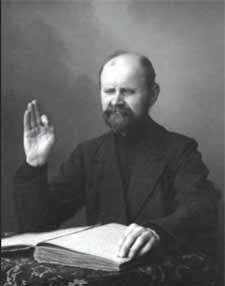
3 minute read
More rear-mirror views
A SILENT SWEDISH RHAPSODY
General John Larsson (Retired) shares fascinating glimpses of the early Army – 1890-1912
WILLIAM Booth’s eagle eyes didn’t miss much. In January 1894 he was conducting a mammoth rally in Stockholm, Sweden. As seekers were streaming to the mercy seat, he noticed there was a profoundly deaf woman in the congregation. ‘Who can show her the way?’ he enquired. Soon, Captain Oktavia Wilkens, a former sign-language teacher, was at her side. Not long afterwards they knelt together at the cross where Captain Wilkens showed the woman the way into the Kingdom by signing with her hands.
The next day the woman signed to her deaf friends: ‘I have met a woman “priest” with a peculiar hat, who speaks our language wonderfully well.’ Her friends wanted to meet this strange ‘priest’, so Oktavia Wilkens held a sign-language meeting for them. And with that meeting the first corps for the deaf was launched.
This ministry to deaf and speechimpaired people soon spread throughout the country under the leadership of Captain Wilkens. These corps had reading rooms where members could meet in the daytime. No other church offered a similar ministry, and the commencement of this work was to prove a turning point for the Army’s acceptance in Sweden.
The Army had reached Sweden 12 years before, when the work began under the leadership of Swedish Commissioner Hanna Ouchterlony. Of all the continental countries, Sweden proved the best fit for The Salvation Army, and it grew to become the second largest Army territory in the world.

Fritz Pousette
During the early years, despite occasional local opposition, the Army met with a remarkably warm response from ordinary people. The leading classes and civic authorities remained cool towards the Movement, but the emergence of work among Sweden’s many thousands of deaf people struck a chord even with them – and more so when the work widened to include blind people.
It was the royal household of Sweden’s King Oscar II that set the new tone of approval, and it was Fritz Pousette, a blind, deaf and speechimpaired Salvationist, who inspired the turning of the tide.
Fritz Pousette was already deaf by the age of one but retained sufficient sight as a child to train as a carpenter. In his teens he set up business. Timber dealers could not cheat him, for he could determine the nature and quality of any wood by biting, smelling and even licking it. Through a chance meeting with Oktavia Wilkens he became a Salvationist, and from then on his braille Bible was never absent from his bench. He radiated love for God and love for life.
The Crown Prince was so impressed with Fritz and his work that he commissioned an escritoire for the palace. King Oscar followed through with a substantial donation to the Self-Denial fund. And when he later gifted land that became an Army woodyard, employing 10,000 men each year, he set the ultimate royal seal on the Army’s work.
‘Taking their tone from the king,’ reports historian Richard Collier in The General Next To God, ‘officers of the Swedish Army now cracked into parade-ground salutes each time Booth’s warriors passed on the street.’ This royal admiration for Fritz Pousette was shared by all who knew him. Watching him giving his testimony was an unforgettable experience. Scanning his braille Bible with one hand, he would tap his words into the hand of a translator with the other. The interpreter would turn his words into sign language and, if blind persons were present, also into speech.
It was always heart-stirring, and never more so than when, at his 75th birthday celebrations, Pousette took as his theme the classic Swedish hymn, ‘Thank You, Lord, For All Your Goodness’ (SASB 395). As he communicated his gratitude to God, everyone recognised that not only his words but also his whole life was a silent rhapsody of praise to his Lord.








